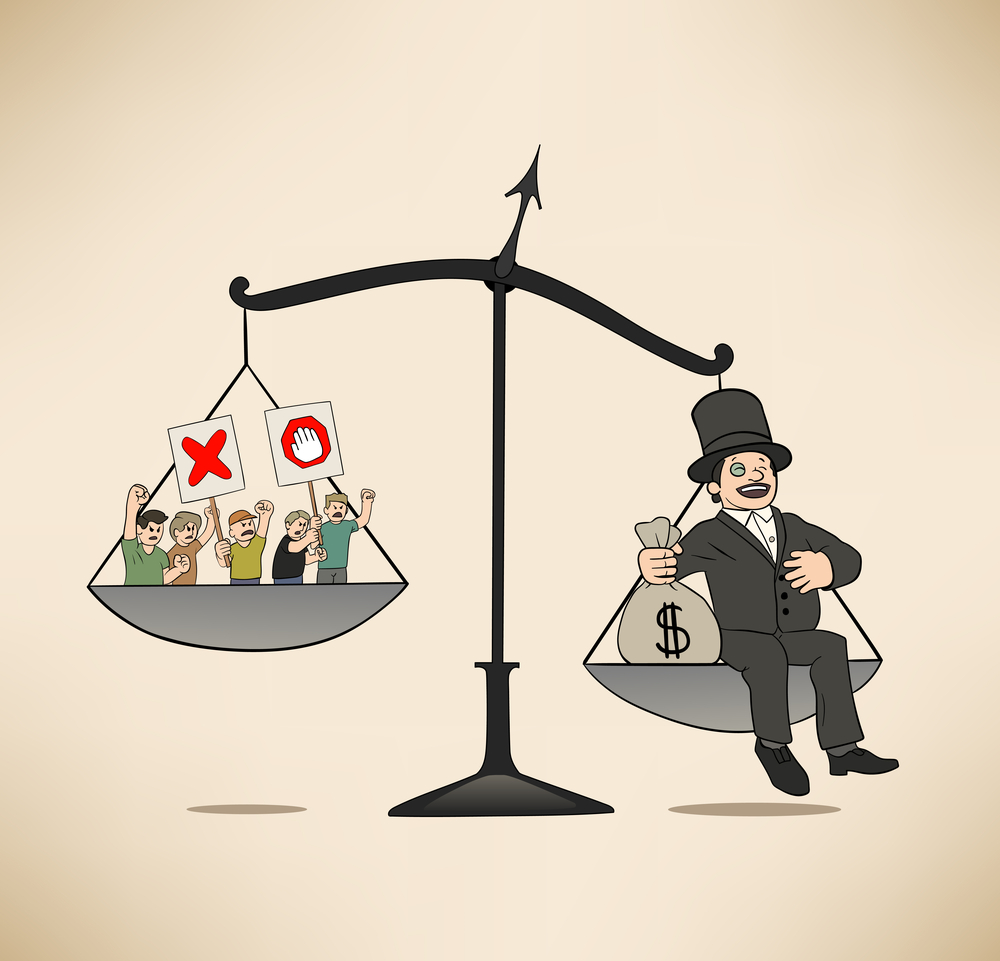The federal government has been waging a war against the middle class and working poor since at least 1970. Wealth inequality has steadily increased since the early 1970s, and it’s not a coincidence. It’s a result of a series of policies. The government wants the masses of American working people broke, propertyless, and dependent upon elected officials for the crumbs they give back as handouts from taxes taken.
The most insidious attack on working people has been inflation, which really took off when the federal government decoupled the dollar from gold in 1971.
The inflation tax is the most regressive tax that currently exists in federal policy.
Inflation always taxes wages twice, once when the labor is performed and the worker is awaiting payment, and again when the wages are deposited into the worker’s checking account. But inflation leaves the rich man’s yacht untaxed.
No level of inflation, no matter how high, can ever take one cent of value away from a yacht. A yacht is always going to be a yacht, no matter what the value of money is.
Inflation taxes the poor man’s rent he advances to his landlord, but leaves private jets and vacation homes untaxed.
Want to know where this inflation tax goes? The stolen value of the inflation tax doesn’t just vanish out of thin air.
Some of it goes to the government; economists even have a name for the benefit government draws from the inflation tax. It’s called “seigniorage.”
Rich people generally don’t pay the inflation tax, and many of them benefit from it. Let’s say you’re a billionaire real estate mogul, not unlike Donald Trump, with a net-worth of $1 billion. You buy houses and real estate, and when you get your 20% equity, you pull that equity out and invest it into another real estate holding. So you have properties worth $5 billion, net assets of $1 billion, and (with only 20% equity in your properties) you also have $4 billion in mortgage debt.
4% inflation lowers the value of the mortgage debt you owe, since with CPI inflation you’re just going to raise the rent 4% next year. Inflation created by the Federal Reserve Bank becomes a gift of $160 million annually to your net worth ($4 billion x 0.04).
Every year.
And it enriches them more if inflation exceeds 4%, as it has in recent years.
If the CPI is 10% (as it nearly was in 2022), inflation alone adds 40% ($400 million) to this real estate mogul’s net worth. That doesn’t count the decrease in the nominal debt paid off by the real estate mogul’s tenants.
And this assumes the value of his property holdings is only increasing at the rate of CPI inflation, which it’s vastly exceeding, thanks to Federal Reserve Bank interest rate manipulation and federal housing subsidies and incentives.
Inflation enriches the real estate mogul with a boatload of mortgages that are now easier to pay off. It also benefits the hedge fund speculator and the banker, who are in the very businesses of being in debt.
In other words, the inflation tax makes the value of money flow directly from the wallets of wage-earners to the vaults of rich people who work with debt.
As long as the working man holds money in his possession, whether in the form of credit to his employer for his labor, in his pocket, or in his checking account, inflation taxes him. Only when the money is finally no longer due to him does the inflation tax end.
Working people know this truth intuitively because inflation raises prices at the grocery store, at the hardware store, at the department store, and the price of real estate.
One of the establishment arguments attempting to minimize the impact of the inflation tax is that an inflation rate of 3% is not an especially heavy tax on Americans individually. Establishment defenders counter that top income tax rates are much higher than 3%, forgetting that income taxes have huge deductibles for the poor at the bottom of the income scale (though not anywhere near as huge as they should be).
The national impact of the wealth transfer from inflation is huge. Total wages in the United States in 2022 was well over $10 trillion, more than 43% of the nation’s entire gross domestic product. Likewise, renters are also creditors to their landlord in advancing their rents (nearly $500 billion annually). And banks take loans from wage-earners as depositors (there are more than $17 trillion in total U.S. bank deposits, much of which is from wage-earners).
Add those together and we’re talking about a transfer of hundreds of billions of dollars annually, even if inflation is kept under just 3%, from mostly working people to the government and the wealthy. The cumulative impact of this happening every year, year-after-year, is giant, and it’s greater as inflation increases (something it has done in recent years).
Again, rich people don’t pay the inflation tax; they benefit from it. Inflation rewards debtors and punishes creditors. Banks benefit because banking is the very business of being in debt. Thus, it should be no surprise that the percentage of U.S. gross domestic product claimed by the financial sector has increased steadily since the age of inflation commenced in the early 1970s.
Inflation punishes working people while they credit their employer with their labor as they wait for payday, while they credit their bank with their wages deposited in their checking accounts, and as they advance to their landlords the first month/last month rent and security deposit before they live in their apartments. But rich real estate developers benefit from inflation because it makes their mortgages easier to pay and the sale price of their properties higher. Rich people can avoid the inflation tax almost entirely by putting their wealth into inflation-proof assets like stocks, real estate and commodities.
Congressmen in both the Republican and Democratic parties used to know how to defend and appeal to working people, explaining that the working man is the one person who cannot defend himself against the inflation tax because the social construct always prevents him from getting an advance on his wages. The hero congressmen of a century ago railed against the toxic populist and progressive movements’ efforts to steal from wages.
The Ron Paul of the late nineteenth century and early twentieth century was New York Democratic Congressman William Bourke Cockran, who constantly and steadfastly defended the working man and his purchasing power in the dollar against populists. Rep. Cochran replied to William Jennings Bryan’s call for inflation by free coinage of silver ionAugust 18, 1896 with remarks in New York City emphasizing that inflation cheats creditors and rewards debtors:
“The laborer is always a creditor for at least one day’s work. When any man can show me a laborer who has been paid in advance for a day’s work, I will show him a laborer who is a debtor. But every laborer that I have known in my experience, every laborer of whom I have ever heard in my examination of the conditions of men, must, by the very law of his being, be a creditor for at least one day’s work, and he is generally a creditor for a week’s work or two week’s work. Every great industrial enterprise has for its chief creditors its own laborers. The heaviest account in every department of industry, whatever it may be, is always the wages account.”
The Irish immigrant Cockran railed in an earlier speech (August 26, 1893):
“On behalf of those men, the real creditors, in the name of the laborers of this country, I protest against the degradation of the dollar, because it means a reduction in the value of the wages paid to toilers.”
Likewise, Republicans also knew. Senator Asle Gronna (R-ND) spoke against the “money trust” on December 17, 1913, in debate over the the progressive movement’s Federal Reserve Act that enabled inflation later:
“The rising prices and depreciation of money which will follow the inflation of the currency will affect every member of the community, but only one class will have the power to regulate it, and that class will be the very one which will be likely to profit from its inflation. The manufacturer will find that he must pay higher prices for his material and he will demand higher prices for the goods that he sells. The merchant will be similarly affected. Professional men will find that the prices on commodities that they purchase increase, while their compensation remains very much what it was. The wage earner will find that this cost of living is increasing, due to rising prices; he will be forced to demand higher wages, and may ultimately get it, but as wages is one of the last to respond to the general upward trend, he will be the one that is apt to suffer the most….”
“I am opposed to giving into the hands of one class the means of exploiting the other classes for its own profit. I do not believe in giving any bank or series of banks the power to say when the laborer carries home his wages at night how much that money shall purchase on the morrow. I do not believe in giving any bank or combination of banks the power to say when the farmer sows his grain how much that grain is to be worth when it is harvested. I do not believe in giving any bank or system of banks the power to say what return any person, high or low, is to receive for his toil, efforts or enterprise.”
Congressman Charles Lindbergh Sr. (R-MN), Swedish immigrant father of the famous aviator, said much the same on December 22, 1913:
“The new law will create inflation whenever the trusts want inflation…This act establishes the most gigantic trust on earth, such as the Sherman Antitrust Act would dissolve if Congress did not by this act expressly create what by that act is prohibited. When the president signs this act the invisible government by the money power, proven to exist by the Money Trust investigation, will be legalized.”
Lindbergh also presciently predicted in the same speech the stock market bubble of the 1920s and the crash in 1929 as a result of Federal Reserve Bank inflation, culminating in the Great Depression of the 1930s:
“…when they get the money they can and will loan it directly to the stock gamblers, to be used to exploit the people.”
Of course, the demagogic, corporate-owned left will tell us that the solution to the oppression of the poor working man is to oppress the rich man as well. “Tax the rich” is the slogan of the corporate-owned left. It’s like observing that the abusive boyfriend of a woman living on the right side of the street gives his girlfriend a black eye every week from abuse, and the single mom on the left side of the street is free from that abuse, and concluding that the only “fair” solution is to get that abusive boyfriend to blacken the eye of the woman across the street every week as well.
The solution is to stop the abusive boyfriend, the government, altogether—not multiply the abuses.
And that’s where the focus should be. Americans need to be reminded by libertarians (both capital-L and lower case-l) that wealth inequality is increasing because of the regressive tax of inflation. They need to be told tha inflation taxes everything from the man who has just about nothing and just about nothing from the man who has everything.

































